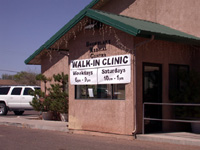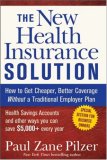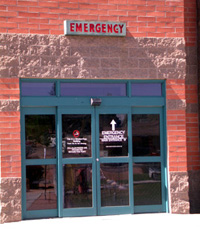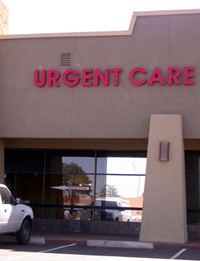|
How to Find Medical Care While You Travel |
|
So you want to retire to the open road in your RV. Thousands of people do it every year, and few would trade this stimulating, mobile lifestyle for the jobs they left behind. But what about health insurance?
(June 2021 Update: Changes in health care law and coverage from 2010 forward may have rendered some of the information on this page out-of-date.)
Some retirement packages include continuing health coverage but, sadly, most do not. In fact, many retirees who were once covered are now in a bind as the rising cost of health insurance is forcing many companies to drop coverage for retirees or raise the rates to unmanageable amounts.
So if you want to travel, what do you do? Postpone your dream? Continue to work until you are eligible for Medicare? And what if you have a pre-existing medical condition that makes obtaining a policy almost impossible? Here are some considerations to keep in mind.
Before you quit your job. If you are currently employed and have health insurance, don't quit before making plans for coverage after retirement. You may be eligible for a conversion policy, or you may need to keep your current coverage to qualify for an individual policy, especially if you have a pre-existing condition.
- Best option: Convert to a high-deductible individual policy as soon as you can; that way you'll still be covered when you leave your job. At the same time, set up a tax-deductible Health Savings Account. This is where you will stash the cash you will need for out-of-pocket expenses and other things like dental and vision expenses, which may not be covered by your new health insurance.
- Another option: Continue your current coverage under the Consolidated Omnibus Budget Reconciliation Act of 1985 (COBRA). COBRA coverage is expensive, but it has an important benefit: Once your continuation coverage is exhausted, you are protected under the Health Insurance Portability and Accountability Act (HIPAA), which, among other things, requires states to offer some type of coverage with no exclusions for pre-existing conditions to individuals who have accepted and exhausted COBRA coverage. Check your state to see how it works.
- If you are within a year of reaching Medicare eligibility, investigate short-term policies. They might not cover a pre-existing condition, but they will be less expensive than a COBRA policy while still giving some peace of mind.
Once you are in the market for a policy, proceed carefully. You do not want to be turned down. A rejection by an insurance company will be recorded in your permanent record with the Medical Information Bureau (MIB), a central database shared by some 600 life insurance and health insurance companies, making it more difficult or impossible to get coverage from any other company. A good independent health insurance agent can help you determine if you will be accepted or can help you withdraw a submitted application if it looks like it will be rejected.
Now would also be a good time to contact the Medical Information Bureau to find out what's in your record. Some entries may be incorrect or could be rewritten more favorably, affecting both your rate and your coverage. You can receive one free report each year.
Choosing your domicile. Domicile is the place where a person has his or her permanent legal home. A person may have several residences, but can have only one domicile. Full-time RVers can choose their domicile. Since states vary tremendously in the regulation and pricing of health insurance, you may wish to consider insurance coverage when choosing your domicile.
A good resource for researching state insurance regulations is "The New Health Insurance Solution," a book by Paul Zane Pilzer (see especially Appendix A). Pilzer's book also covers residency requirements.
Choosing a policy. There is no one-size-fits-all health insurance policy and no easy way to find a policy without doing a lot of research. Use the resources mentioned in the sidebar and talk to other RVers. If you have special circumstances, or can't understand all the fine print, then locate an independent agent. Some general advice applies to everyone.
1. While you are researching the particular rules and protections in your state, check out the records of the insurers operating in the state. Also find out about financial assistance -- you may qualify.
2. Check out the report cards issued by the National Committee for Quality Assurance, which rates health insurance policies that have been accredited by the organization.
3. Use an online search site like eHealthInsurance.com to compare plans and get quotes. But be wary of sites that request your name and address or other personal information before providing a quote; they may not deliver online quotes and instead sell your personal information.
4. Even if you don't have special circumstances, consider using an independent agent, i.e. one who represents a number of different insurance companies. An independent agent can tell you which companies are reliable and help you with the application process.As for particular policy features, consider the following:
- Cost of premium (though cheapest may not be the best
- Lifetime limits ($5 million minimum)
- Coverage not subject to the deductible (e.g., well visits)
- Co-payments
- Coverage when traveling (not all insurers will cover you in every state)
- Exclusions
What about pre-existing conditions? People who have pre-existing medical conditions have the most trouble finding coverage. Many states allow insurers to exclude these conditions, charge exorbitant rates for them or refuse coverage altogether. "The New Health Insurance Solution" is an excellent resource for RVers in this situation. Here are some key points from the book:
Remember, HIPAA ensures the portability of health insurance if you lose or change your job, regardless of pre-existing conditions. Certain conditions must be met, however, so do your research before leaving or retiring from your workplace.
Five states -- New York, New Jersey, Massachusetts, Maine and Vermont -- are "community-rated," meaning that your health and age do not affect the size of your premiums.
- Many states maintain a special insurance pool to cover high-risk individuals. A high-risk policy will be more expensive than a regular policy, but at least you will have coverage. In some cases, you need to be HIPAA-eligible to qualify for the policy.
- A few states have annual open-enrollment periods during which you can get coverage no matter what your health history is. Check the reliability of the insurance company if possible.
- Couples should consider separate policies if one person is substantially older or has a pre-existing condition. In a few states, however, the lower-risk person can be added to the high-risk policy for less than the cost of a separate policy.
- If your retirement income will be low, you may qualify for Medicaid or for special state programs and assistance. In some states your income can be more than $30,000 and you can still qualify for help.
What about working on the road? I'm a big proponent of working on the road, both for extra cash and for the interesting people and experiences you'll encounter; in fact, I've written a book on the subject (see Resources). Road jobs don't often provide health insurance, but a few do. Kelly Services, an agency for temporary workers, offers health insurance through a third-party vendor. You can easily transfer your records from one Kelly location to another as you travel. Contact local Kelly offices for information.
AARP's National Employer Team includes some employers -- Home Depot, for example -- who extend benefits to seasonal workers who work in two different locations. Home Depot also provides some benefits to part-time workers.
Companies looking to recruit older workers sometimes offer benefits as an enticement. Yuma Regional Medical Center in Yuma, Ariz., for example, hires health care specialists during the busy winter months when the city almost doubles in size. The benefits include health insurance for workers who work long enough; they also include flexible schedules, housing and mileage allowances.
Two last things
- Be cautious about joining an association just to obtain health insurance. If the underwriter is based in state other than your own, it may fall under different regulations in your state and not offer you as many protections as you think. Check your state's regulations.
- Medical discount cards are not health insurance. Some cards, like those issued by Costco and Wal-Mart, are legitimate, but many cards are worthless. Check with your health care providers to see how much discount you will get and whether you can get the same or better discount for paying cash without the card.
Health insurance is critical to your well-being and your peace of mind on the road. Yes, it will take some work to sort out what coverage you need and how to get it, but when you are out traveling in your RV, seeing all the sights North America has to offer, you'll know it was well worth it.
Jaimie Hall-Bruzenak
5/9/08
(Updated June 10, 2021, RTA)







